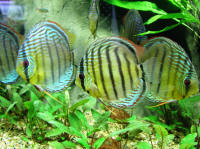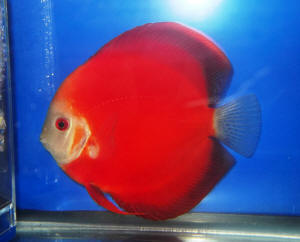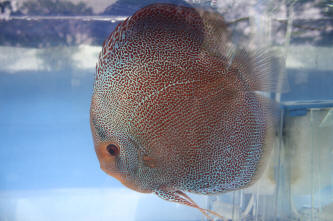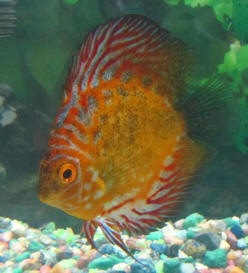|
FAQs on Discus
Identification
Related Articles: Plants +
Discus = Wow! by Alesia Benedict, Planted Aquariums: Plants and Discus: What They Need To
Thrive By
Alesia Benedict, Discus Divas, Glitz,
Glam and Lots of Demands by Alesia Benedict, Juraparoids, Neotropical Cichlids, African Cichlids, Dwarf South American Cichlids, Asian Cichlids, Cichlid Fishes in General,
Related FAQs: Discus
1, Discus 2, Discus
Selection, Discus
Compatibility, Discus
Behavior, Discus Systems,
Discus Feeding, Discus Disease, Discus Reproduction, Cichlids of the World, Cichlid Systems, Cichlid Identification, Cichlid Behavior, Cichlid Compatibility, Cichlid Selection, Cichlid Feeding, Cichlid Disease, Cichlid Reproduction,
|

|
Discus Grand Champ Aquarama 2013
5/31/13
Photo of the Discus champ
<Wow; that's pigeon red! B>
Perry |
 |
|
Singapore Fish Carnival 2012
12/10/12
Bob
Photo of the Discus Grand Champion. I think its the same one that won last
year
Perry
<Neat! BobF>
|
 |
How to sex discus,
& overfeeding FW Ray 7/5/10
Hi crew,
<Pat,>
I have a couple of questions:
1) Can you tell me how to tell the difference between male/female
discus?
<You can't. Of course, the genital papillae will be different,
but by the time the female exposes her papilla the fish will be within
hours of spawning anyway, so you'll likely know which fish are
paired.>
2) I understand the concept of not wanting uneaten food remaining in
the aquarium and rotting and fouling the water. But when I feed
Blackworms, is it still a concern if there are any left?
<Yes.>
My ray is always foraging, as are my discus. In fact, it seems that
they can't seem to get enough. Will they stop eating at some
point?
<Not really. If you're providing protein-rich, but fibre-poor
foods, you're essentially asking whether a child will stop eating
candy at some point -- yes, but not before that child makes itself
sick.>
As their bellies swell, I figure that they've had enough. Is there
a formula to follow?
<Experience; common sense. The aim is to provide enough to keep a
normal body profile, but not so much they are swollen, or so little
that their bellies have a concave profile. Under-fed rays lose
condition quickly, while nitrate-rich water from overfeeding quickly
stresses them. This is why you need a big aquarium and massive water
changes to keep Stingrays healthy. Several small meals per day is
better than one big one, and skipping a day doesn't do any
harm.>
Also, is there a concern that overfeeding will cause more poop
therefore fouling the water that way?
<Faeces are largely irrelevant, since they contain mostly material
that doesn't decay into ammonia quickly/at all. The toxic ammonia
comes from protein metabolism within the fish, and that's invisible
to you. Uneaten food of course rots, and in doing so releases ammonia
via saprotrophic bacteria.>
I have my tank on a "drip" water change, and this morning my
Nitrates are less than 20ppm, judging by the color of the test strip,
I'd say maybe 10ppm.
<20 mg/l nitrate is high by Stingray standards; you're aiming
for near-zero levels, and preferably no higher than 10 mg/l. Anything
above 40 mg/l quickly becomes toxic.>
As always your help and direction are greatly appreciated!
Thank you
Pat
<Happy to help. Cheers, Neale.>
|
Discus, ID
19.01.09
I just sent you an e mail regarding my new orange discus. This is
a picture of him. Could you possibly tell me what type of discus
he is? Thanks again, Lena
<Read here:
http://wetwebmedia.com/FWSubWebIndex/discusfish.htm
Bob Fenner>
Discus, gen.
19.01.09
Hi there, my friend has a discus tank and they have always gotten
along until recently. One of the discus, a burly orange male (not
sure of exact type) started picking on the others in the tank,
more so than the usual pecking order. So, this friend offered me
the discus.
<Are social species>
I have had him for two days now, and he is eating well and
swimming around and seems extremely happy now. He is alone in a
30 gallon aquarium. I was wondering, will he be alright by
himself?
<Mmmm>
Or should I get him a, or some, tank mates?
<Read the linked files above here:
http://wetwebmedia.com/FWSubWebIndex/discusfish.htm>
I like having one fish alone, and he seems perfectly happy. Also,
he is roughly two years old and is only about 4" - 4
1/2". He was kept in an over crowded tank (hence the reason
for the fighting) but I am just wondering if
he will grow more now that he has more space and less stress? I
have always wanted discus, but they come with such a high price
tag and they are considered to be very sensitive fish, I never
purchased any. I suppose the risks scared me away from it. Now
that I have one, I have never admired a fish so much! I do not
think I will keep any fish other than a discus again! Thanks for
your help once again! Lena
<Welcome. Bob Fenner>
|
 |
Skin of Discus
fish 01/13/2008 Hello! I want to know about
Discus Fish. Difference between the shape of Leopard Skin and Snake
Skin of Discus fish. I can't choose, what is Leopard Skin? What is
Snake Skin? In my eye the skins are same. Thanks WWM Crew, NoMo
<They look pretty similar to me, too. Both have a mottled pattern of
red squiggles on a blue (or whatever) background. In theory,
"leopard-skin" Discus have a more leopard-like pattern (i.e.,
spots and squiggles), while "snakeskin" ones have a pattern
more like snake skin (i.e., mostly spots). But that doesn't seem to
mean much in real terms. Retailers use them interchangeably, and so do
many Discus breeders. You can even find varieties called "leopard
snakeskin" Discus! So instead of worrying too much about the
names, look for good quality specimens of a variety that appeals to
you, and work from there. Cheers, Neale.>
Reference your website -
Discus - 04/14/07 Dear Sirs, <Hello Heiko!> I just had
a look at your nice website and your Discus info page. My name is Heiko
Bleher and I just wanted to comment the following: Unfortunately the
information you have about discus are very old and outdated. The
taxonomy has changed, the information about species and colours, the
variants in the wild, etc. etc. <Yes, thank you for this. I penned
this piece many years ago> Maybe you would like to have a look at my
book: BLEHER'S DISCUS to update it. You can find it almost
everywhere in the web (just enter my name under www.yahoo.com and you
will find it). Or under www.aquageo.cvom,. or www.aquapress-bleher.it
All the best always Heiko <Thank you... Will also post your message
for others to find, use your work on Symphysodon. Cheers, Bob Fenner,
who hopes to see you at the next/08 InterZoo.> Aquapress Publisher
Heiko Bleher Via G. Falcone 11 I-27010 Miradolo Terme (Pavia) Italy
Tel. +39 0382754707 - Fax +39 0382754129 www.aquapress-bleher.it
www.aquageo.com - www.Joachim-Frische.com
Discus species page 102 of Nov. Tropical Fish Hello, <Hi
there> My name is Michael Milliner, a discus enthusiast near
Washington DC. I have several wild caught discus that are
almost identical to the one shown in your November article in Tropical
Fish.page 102. I've been told it's a "Madeira
Blue", but I'm not sure. I'd be most
appreciative if you could confirm. <Yikes> While some of my seven
discus are almost identical to the one shown. Some are close but
don't have the dark black rim. some have more turquoise and
burgundy on the stomach area. Would it be likely they're all the
same with typical minor variations and age related differences. or more
likely different types?? Thanks so much!! Michael <I don't know
enough re this matter... most of my Discus/Symphysodon pix are made at
industry trade shows... in foreign countries. Will ask our resident
all-around cichlid expert, Chuck Rambo if he knows where to ask next.
Bob Fenner>
|
|

